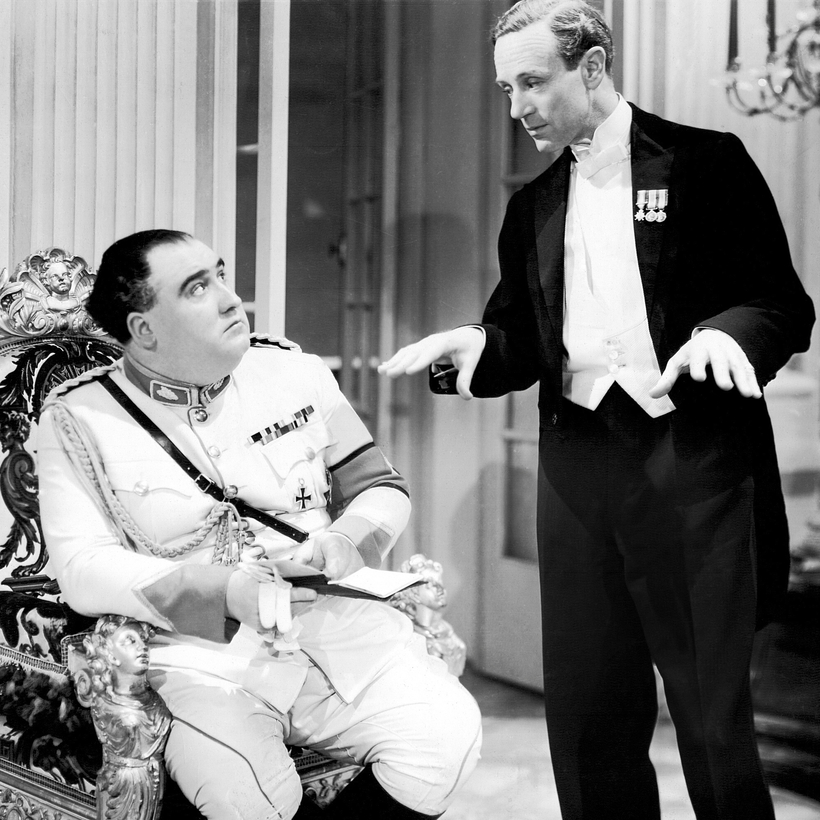Toward the start of the British wartime movie ‘Pimpernel’ Smith—a modernization of The Scarlet Pimpernel (and also starring Leslie Howard)—in which an absentminded Cambridge University professor rescues enemies of the Nazis from under the nose of the Gestapo, the corpulent and ferocious Reich Minister is seen poring over a pile of books. “Know your enemy!” he adjures a terrified subordinate. “I am told that the English have a secret weapon: their sense of humor! And I am determined to find out all about it.”
And so this pastiche of Hermann Göring has spent his time reading P. G. Wodehouse, Punch, Edward Lear, and Lewis Carroll. Predictably, he does not get any of the jokes and concludes that the English sense of humor is a myth, before adding, sinisterly, that when he is gauleiter of London he will see to it that “there is no talk of sense of humor.”
This short scene—indeed the whole movie—exemplifies how the British chose to think about their struggle against Nazi Germany: the great Teutonic Leviathan, bullying, bellicose, and barbaric, versus the plucky, puckish, peaceable English. It is a prime illustration of what Alan Allport, in his book Britain at Bay, calls the “Shire folk narrative”—the idea that the post–World War I British conceived of themselves in much the same way that J. R. R. Tolkien imagined the hobbits in his Lord of the Rings trilogy. The English were a “sleepy, decent and most pacific race,” declared the M.P. Harold Nicolson in his 1939 book Why Britain Is at War. They were gardeners, not warriors, who desired “nothing on Earth except to retain their liberties, to enjoy their pleasures, and to go about their business in a tranquil frame of mind.”
The idea was that the post–World War I British conceived of themselves in much the same way that J. R. R. Tolkien imagined the hobbits in his Lord of the Rings trilogy. They were gardeners, not warriors.
The enduring appeal of the “Shire folk narrative” lies in the fact that it offers an explanation for Britain’s catastrophic failures during the years 1938–41 (the period covered in Britain at Bay) as well as her ultimate victory. It was the innate passivity of the British which prevented re-armament; the laudable loathing of war which produced the policy of appeasement. The string of military disasters suffered by the British in the early years of the war were due to a combination of unpreparedness and amateurishness, and yet it was the rallying of the British people and the work of ingenious amateurs that saved the nation in its darkest hour.
The Sun Never Sets …
As Allport points out in this well-written book, much of this is bunk. The English may have neglected re-armament in the early 30s, but by 1939, the year in which war broke out, the country was already engaged in the greatest peacetime military expansion in her history. Britain may have been a small island, but she was also the center of an empire covering a quarter of the globe. Twenty-three percent of the world’s wheat, 50 percent of its rice, 60 percent of its rubber, 50 percent of its chrome, and 70 percent of its gold came from territories administered by the British.

And with imperialism came violence. In a particularly harrowing chapter, Allport describes how members of the Second Battalion Royal Ulster Rifles murdered an estimated 20 innocent Palestinians, in September 1938, in reprisal for the deaths of two of their comrades killed by Arab terrorists.
Nor was British amateurism always so glorious. Neville Chamberlain’s amateur diplomacy, conducted not only against the evidence but also against the advice of the Foreign Office, was a disaster, while the “miraculous” evacuation of the British Expeditionary Force from Dunkirk owed far more to the calm professionalism of the Royal Navy than to the “little ships” memorialized ever since. Indeed, in a paragraph that Boris Johnson should be forced to write out a hundred times, Allport notes that “every time during the Second World War that the British attempted to muddle through with inspired amateurism, the result was a disaster. Every time they accomplished something it was because of careful planning and professional expertise.”
The “miraculous” evacuation of the British Expeditionary Force from Dunkirk owed far more to the calm professionalism of the Royal Navy than to the “little ships” memorialized ever since.
Of course, one of the reasons that the “Shire folk narrative” has been so successful is that significant portions of it are true. Although the British were capable of brutality, massacres such as that which occurred in the Palestinian village of al-Bassa were remarkably rare. Britain may not have been technically “alone” in the summer of 1940—she was supported by her empire, including the English-speaking dominions of Canada, South Africa, Australia, and New Zealand—but, as Allport himself observes, “when the Luftwaffe’s bombers were just a few minutes’ flying time from Dover, how much consolation was there to be gained by a reminder that New Zealand, 11,500 miles away, was standing by the motherland?”
Many of the myths cited by Allport have, it should be acknowledged, already been exploded by historians. Yet their popular endurance more than justifies this lively example of revisionist scholarship. After all, had they been more conspicuously discredited in the decades following the Second World War, then there is a strong chance we would have never heard the word “Brexit.”
Tim Bouverie is the author of Appeasement: Chamberlain, Hitler, Churchill, and the Road to War


